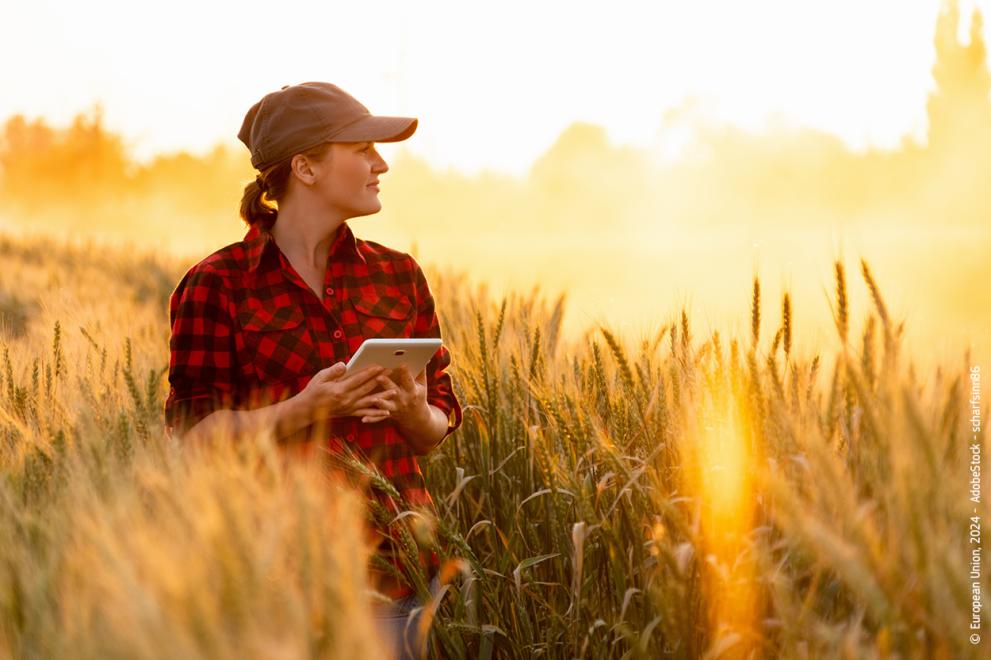
The European Commission has launched an interactive tool offering clear and comprehensible information on sustainability in agriculture. The Agri Sustainability Compass brings together 20 key indicators for the three dimensions of sustainability in agriculture and rural areas. This helps users quickly grasp the current state of agriculture’s sustainability and its evolution over time.
Navigating within the vast amount of information on sustainability in agriculture can be challenging. What key graphs should we look for? Where can we access the relevant data? How can we evaluate the progress in sustainability efforts?
Building on the wealth of information already available on the Agrifood Data Portal, the European Commission has aimed to answer these questions by creating a new, easy-to-use interactive tool called the Agri Sustainability Compass. The tool synthetises some of the main indicators of economic, environmental and social sustainability and provides up to date information. It helps to understand how the farmers of today and the sector are performing compared to the past. By depicting the ongoing trends in agriculture, everyone is able to follow the progress of the sustainability indicators, which will indicate whether EU agriculture is on track. This is done publicly and transparently thanks to the Agri Sustainability Compass. The results of any search are exportable and downloadable. The dashboard will be updated regularly.
What can the Agri Sustainability Compass tell us?
Sustainability is the cornerstone of our agriculture. Understanding how we can advance it is imperative. For agriculture to be sustainable, many different angles must be considered, requiring different indicators. Each indicator is accompanied by an assessment of the trend in view of its desired direction.
Regarding the indicators themselves, the Agri Sustainability Compass first presents key indicators for assessing the economic performance of EU agriculture. An indicator such as ‘Trade balance’ evaluates competitiveness, while ‘Agricultural productivity’ measures efficiency. ‘Earnings comparison to average wages’, ‘Net value added per worker’, and ‘Average farm size’ reflect income developments, labour productivity, and structural changes within the agricultural sector. This information reflects the economic reality of EU farmers.
Secondly, the tool highlights nine key indicators focusing on environmental sustainability looking at agriculture’s interaction with the environment and its impact on biodiversity, soil health, water quality, and air pollution. Indicators such as ‘Farmland birds index’, ‘Crop diversity’, and ‘Nitrates in groundwater’ assess biodiversity, farming practices, and water pollution. Pesticides, organic agriculture, ammonia emissions, and greenhouse gas emissions indicators track environmental and climate impacts and sustainability efforts linked to EU farming practices.
Finally, the social sustainability indicators such as ‘Share of farm managers by age’, and ‘Share of farms managed by women’ reflect concerns about generational renewal, and gender equality. Additionally, indicators like ‘Training of farm managers’ and ‘Poverty rate in rural areas’ provide insights into access to education and the risk of poverty within rural communities. Furthermore, this section includes indicators that respond to societal questions like ‘Antibiotic use per animal’, which is relevant for the risk of antibiotic resistance,
These key metrics enable interested users to understand complex aspects of agricultural sustainability and get an overview of the ongoing trends in simple terms. The user-friendly layout helps quickly debunk some common misconceptions about agriculture and shows that agriculture is not starting from zero on its journey to sustainability.
Sustainability in agriculture
The agri-food sector is working to address sustainability. The European Commission continues to promote and incentivise sustainable farming practices. The common agricultural policy (CAP) has a key role in supporting the transition of European agriculture to more sustainable farming. The CAP aims to strike the balance between economic, environmental and social sustainability for the benefit of farmers, rural communities, and the EU as a whole.
Most of the Agri Sustainability Compass’ indicators are also part of the CAP indicators, which measure the performance of the CAP. They also serve to evaluate whether the CAP is helping the agricultural sector to make the transition to increased sustainability. In line with its transparency and monitoring requirements, the European Commission has been presenting multiple online dashboards about the content and ambition of the approved CAP Strategic Plans.
Details
- Publication date
- 17 May 2024
- Author
- Directorate-General for Agriculture and Rural Development
- Location
- Brussels
